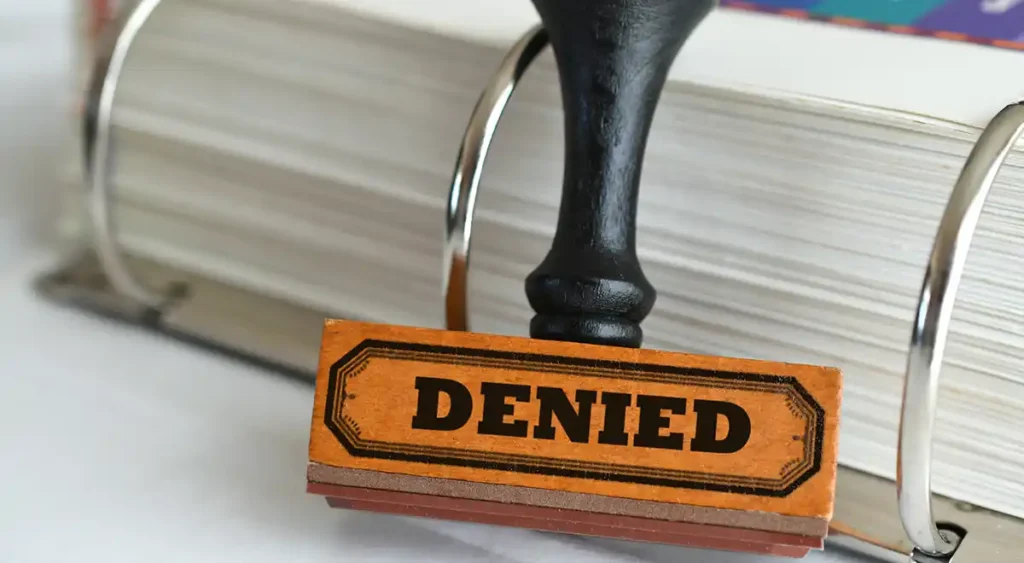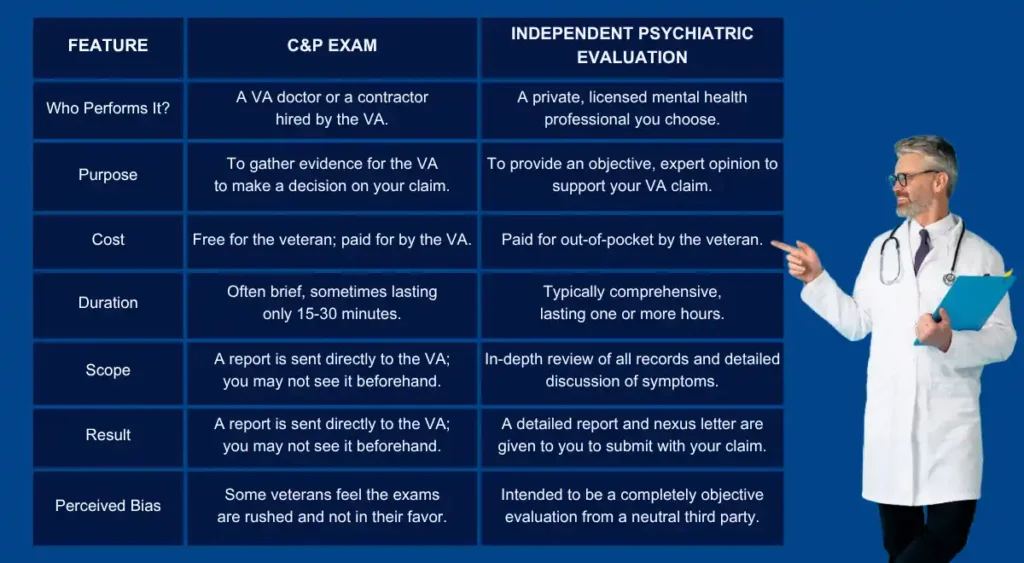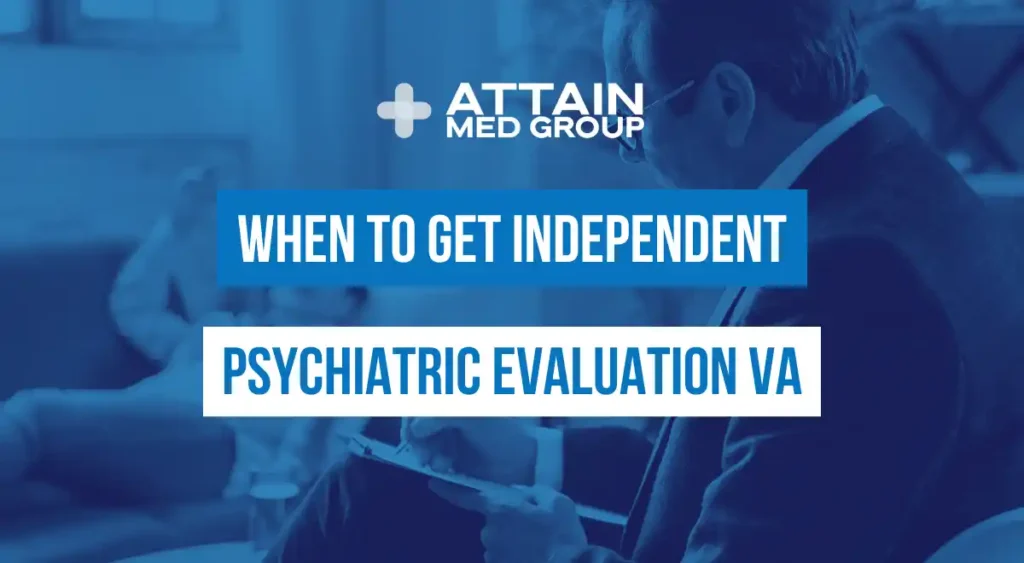Dealing with the VA system for a mental health claim can be a long road, especially if your initial disability claim is denied. Many veterans wonder about an independent psychiatric evaluation for VA claims and when to get one. This assessment from a private medical professional can provide a fresh, unbiased perspective on your mental health condition.
An independent psychiatric evaluation is performed by a psychiatrist or psychologist not employed by the VA. The goal is to get an objective evaluation of your mental health, which can be a powerful piece of medical evidence for your case. Understanding when and why you might need one can make a significant difference in the outcome of your VA disability claim.
This article will explore the details of independent psychiatric evaluations and how they can support your effort to receive compensation for a service-connected mental health disorder.

What Is an Independent Psychiatric Evaluation for VA Claims?
An independent psychiatric evaluation, also known as an Independent Medical Opinion (IMO) or Independent Medical Examination (IME), is a comprehensive assessment of your mental health. This evaluation is conducted by a licensed mental health professional who has no affiliation with the Department of Veterans Affairs. This separation is important, as it helps provide a neutral and objective evaluation of your condition.
The evaluation focuses on several key areas for your disability claim. The examiner will work to establish accurate diagnoses for any mental disorders you may have, such as post-traumatic stress (PTSD), a depressive disorder, or an anxiety disorder. They will also assess the severity of your mental health symptoms and how they impact your daily life.
A critical component of this independent medical opinion is establishing a service connection. The health professional will review your service records and medical history to form a professional opinion on whether your military service caused or aggravated your health condition. This report can serve as a strong nexus letter, a document that explicitly links your condition to your service.
When Should You Consider Getting an Independent Evaluation?
While not every veteran needs an independent evaluation, there are specific situations where it can be extremely beneficial. Obtaining one could be the step that helps you secure the VA benefits you have earned. Consider getting an independent psychological evaluation if you find yourself in one of the following scenarios.
1. Your Claim Was Denied
A claim denial can be disheartening, but it is not the end of the road. If the VA denied your mental health claim, an independent evaluation can be instrumental in an appeal. The denial letter often specifies a lack of medical evidence or a missing link to your service, which a detailed report from a private doctor can directly address.
This new medical evidence can form the basis of a Supplemental Claim. It directly counters the VA’s reasoning by providing additional support from a qualified medical professional. Many veterans find that this fresh perspective is what convinces the VA to approve their health claim upon review.

2. You Disagree with the VA’s Rating
Perhaps the VA approved your claim and established a service connection, but the disability rating seems too low. Your disability rating determines the amount of monthly compensation you receive, so an accurate rating is vital. The VA rates mental health conditions based on their impact on your social and occupational functioning.
An independent evaluation can provide a much more detailed picture of your health challenges. A private examiner may spend several hours with you, documenting specific examples of how your symptoms affect your daily functioning, such as causing memory loss or significant social impairment. This in-depth analysis can justify a higher disability rating by showing the true severity of your mental health condition.
3. Your Symptoms Have Gotten Worse
If your mental health has deteriorated since you first filed your claim or received your last rating, you can file for an increase. To be successful, you must show that your health condition has worsened. An independent evaluation provides current, powerful medical evidence to support your request.
The report from a private medical professional can document the progression of your health symptoms over time. It can clearly illustrate the increased severity and its effect on your life. This objective evidence is exactly what the VA needs to see to approve a higher disability rating for your mental health.
4. You Have a Complex Mental Health Condition
Some mental health claims are more straightforward than others. However, if you suffer from multiple mental health conditions, or a mental disorder combined with other issues like chronic pain, your case can become complicated. For instance, untangling the symptoms of PTSD, an anxiety disorder, and a traumatic brain injury requires significant expertise.
An independent evaluator, especially one with experience in complex cases, can take the necessary time to understand your unique situation. They can differentiate between overlapping symptoms from various medical conditions, such as eating disorders or panic attacks, and explain how they relate to your service. This clear explanation can prevent confusion during the VA claims process and lead to more accurate diagnoses.
5. You Need to Establish a Service Connection
For any VA disability claim to be successful, you must prove a link, or nexus, between your current health condition and your military service. This is known as the service connection. An independent evaluation is one of the most effective ways to establish this link, often resulting in one or more nexus letters.
During the evaluation, the health professional will thoroughly review your complete file, including service treatment records and private treatment records. They will then write a medical opinion explaining how an event, injury, or illness during your military service led to your current mental health challenges. A strong, well-reasoned nexus letter from a credible medical expert can be the most important document in your entire claim file.

C&P Exam vs. Independent Psychiatric Evaluation: What’s the Difference?
Veterans often get confused between the VA’s own exam, called a Compensation & Pension (C&P) exam, and an independent psychiatric evaluation. While both are a medical evaluation, they serve different functions in the disability claims process. Understanding the differences can help you decide if you need to seek an independent medical opinion.
A C&P exam is requested by the VA to gather information about your health condition. An independent evaluation is something you seek out and pay for on your own to provide additional evidence for your claim. Here is a table comparing the two:

While a C&P exam is a required part of the VA process, an independent evaluation is an optional step you can take. It allows you to add a powerful voice to your side of the story. It gives you more control over the medical evidence presented for your mental health claim.
How to Get an Independent Psychiatric Evaluation
Finding the right professional for an independent evaluation is a critical step. The credibility of your examiner can have a major impact on how the VA weighs their opinion. Follow these steps to find a qualified expert.
- Research Professionals: Look for licensed psychiatrists or psychologists in your area who specialize in working with veterans.
- .Verify Credentials: Once you have a few names, check their credentials. Make sure they are fully licensed and have experience with the specific language and requirements of the VA disability claims process.
- Discuss Your Case: Contact the mental health professional to briefly discuss your case and ask about their experience with writing nexus letters for VA claims. This initial conversation can help you determine if they are a good fit for your needs.
- Gather Your Documents: Before your appointment, collect all relevant records. This includes your DD-214, service treatment records, all veteran’s medical records from the VA and private doctors, and any buddy letters or personal statements you have.
- Be Open and Honest: During your medical evaluation, be completely honest about your mental health symptoms and experiences. Providing a full and accurate picture is necessary for the professional to write a compelling and credible report.
Keep in mind that you will be responsible for the cost of this evaluation. While it can be a significant expense, many veterans find the investment worthwhile when they receive the disability benefits they deserve.
What to Expect During an Independent Psychiatric Evaluation
The evaluation itself is a detailed and structured process. The mental health professional will likely spend a significant amount of time with you, often one to three hours or more. The goal is to get a complete understanding of your mental health history and its connection to your military service.
The session will start with an extensive interview. The examiner will ask about your life before the military, your experiences during your military service (including any traumatic stress), and the onset of your mental health symptoms. They will want to know how these health symptoms affect your daily life, work, relationships, and social functioning.
In addition to the interview, the professional might use standardized psychological tests to get an objective measure of your condition. After the assessment, the examiner will review all your records and compile a comprehensive report. This document will include their findings, a formal diagnosis, and a clear medical opinion regarding the service connection for your health disorder.
How an Independent Evaluation Can Strengthen Your Claim
A well-written independent evaluation can significantly bolster your VA disability claim. It offers credible medical evidence that can be persuasive to VA raters. It strengthens your case in several important ways.
First, it provides a completely unbiased, expert opinion on your health condition. This perspective from outside the VA system can carry a lot of weight. It shows that an independent medical expert agrees with your claim.
The report can also fill in any gaps that may exist in your medical records. The examiner can connect the dots between your military service and your current health challenges, which may not be clear from your other records alone. This is crucial for establishing the VA nexus.
Furthermore, an independent evaluation can clarify the severity of your symptoms and how they impair your daily functioning. By using specific examples and standardized test results, the report can provide a clear justification for a higher disability rating. This helps the VA rater understand the full scope of your mental health challenges.
Finally, the evaluator can explain complex medical concepts in simple terms. This makes it easier for the non-medical personnel at the VA to understand the nature of your mental health disorder. A strong report is a powerful piece of advocacy on your behalf.
Tips for Making the Most of Your Independent Evaluation
If you choose to pursue an independent psychiatric evaluation, you want to make sure it is as effective as possible. How you prepare for and participate in the evaluation matters. Here are some tips to help you get the most out of the experience.
Be completely honest about your symptoms. Do not exaggerate them, but also do not downplay them out of pride or habit. The mental health professional needs a fully accurate picture of your condition to write an effective report.
Provide specific details and examples. Instead of just saying you feel anxious, describe having panic attacks in public or avoiding social situations. Explain how your memory loss affects your ability to perform daily tasks or hold a job.
Bring all of your supporting documents to the appointment. The more information the evaluator has, the stronger their report will be. This includes all your military service records, treatment records, and personal statements.
Prepare your own notes before the evaluation. Write down the key points you want to discuss, including specific events from your service and a timeline of your symptoms. This can help you stay focused and ensure you do not forget to mention anything important during the interview.

Conclusion
An independent psychiatric evaluation for VA claims can be a vital resource for veterans seeking the benefits they have rightfully earned. It provides an objective, detailed assessment of your mental health condition from a professional outside the VA system. This can be particularly useful if your initial claim was denied, you believe your disability rating is too low, or you have complex health challenges.
The resulting report and nexus letter can supply the powerful medical evidence needed to establish a service connection and demonstrate the true severity of your symptoms. This can lead to a successful outcome for your mental health claim. By taking this step, you are actively participating in the disability claims process and working to get the additional support you need.
Remember, the purpose of a VA disability claim is to help veterans receive compensation for injuries and illnesses sustained during their service. An independent medical evaluation may be the tool that helps you achieve that goal. It allows you to present the strongest case possible for the VA benefits you are owed.

